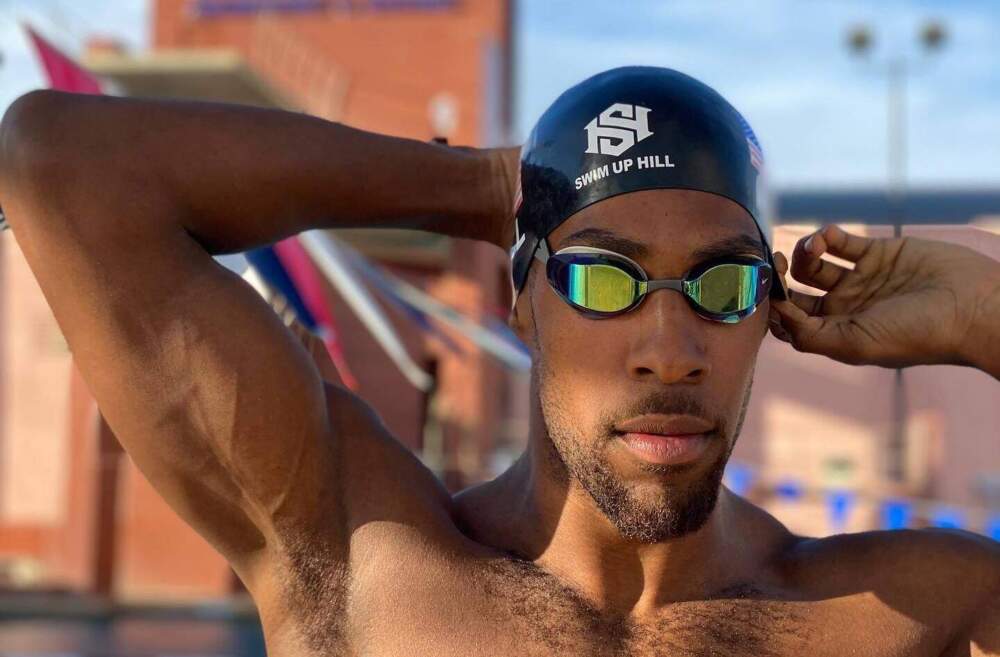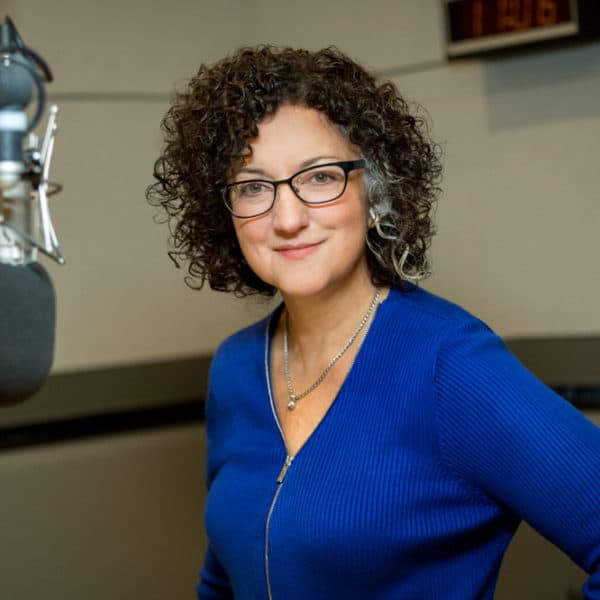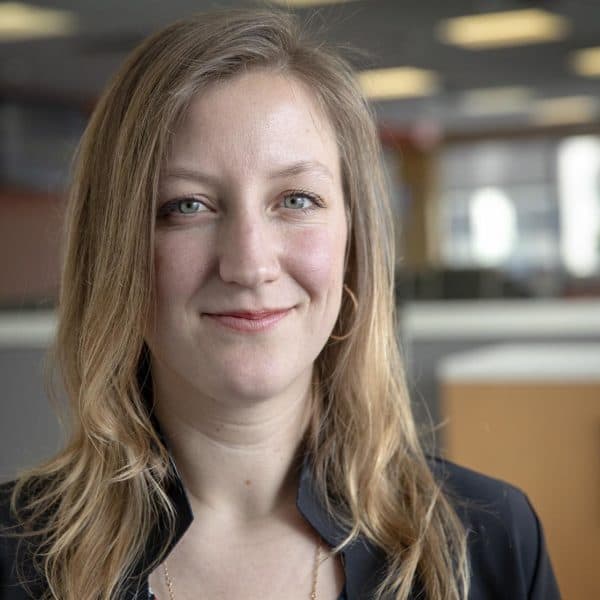Advertisement
Meet Jamal Hill, the Paralympic swimmer embracing a disability he didn't know he had
Resume
At the 2021 Tokyo Paralympics, U.S. swimmer Jamal Hill took home the bronze medal for the 50-meter freestyle. Hill, who’s from Inglewood, California, is competing again in this year’s Paralympics in Paris in the S9 category 50-meter freestyle.
S9 is the category of disability. Hill has Charcot-Marie-Tooth disorder — a rare degenerative nerve disease — and will compete against athletes with similar disabilities.
Hill didn’t experience symptoms of Charcot-Marie-Tooth disorder until he was 10 years old. The onset of the disease put Hill into a paralytic state and hospitalized him for several days.
“Prior to that experience, I could run, jump, everything any relatively normal 10-year-old kid can,” Hill says. “I had to relearn how to walk, [I] also had to relearn how to work my hands, how to write, how to hold pencils, hold doorknobs. I retained 0% nerve capacity from my knees to the soles of my feet, and then from my elbows to my fingertips, 30% nerve capacity.”
Interview transcript
Here & Now’s Lisa Mullins: 0% nerve capacity, meaning you can’t feel anything from yours knees to the soles of your feet?
Jamal Hill: Feeling is an interesting word. I can feel external to internal. So things like heat, though my temperature gauge isn’t very good because of the lack of neurological presence.
My ability internal to external — so things like muscle development, wiggling my toes — that is what is impaired. That is what is at 0%.
Mullins: But you use to your legs and your feet when you swim? Or don’t you?
Hill: Well yeah, it’s there, you know. So definitely it's not going to waste, even though it's not optimal, obviously.
Just imagine someone walking on stilts. You know, that whole stilt is not a part of the person's leg. They probably can't jump very well on that stilt. They can run. They can walk. They can sit, but they're not very good at it because they don't have enough leverage. You know, it's not an actual leg.
That's very akin to what my experience is. So in the water, I'm on a horizontal plane. Ultimately any swimmer will tell you that you got to kick from the hips. That doesn't change. So when I kick, I don't feel it go all the way through the toe. I imagine a little bit more like a whipping sensation, just having some faith that it's making it there and it'll get me across the pool.
Mullins: And it does help you? Your swimming is not all based on arm strength?
Hill: Well, it's all based on core strength. The legs and the arms are secondary levers. The core is everything. And I have a very strong core. That said, the arms and the legs help. And I don't have 100% of either one.
Mullins: How did you get from that point when you were 10 years old with the onset of this disease, you became, as you say, paralyzed. How did you get to the point where you are now, an Olympic athlete going to the Paralympics?
Hill: How? I mean, I would have to say it's first and foremost, amazing parents. ‘I can't’ was never in the vocabulary.
Reasons are part of life, but excuses are never acceptable. There was just a really, not only a high bar set, but just, there was no ceiling put on it, you know? And I was really encouraged to not accept limiting beliefs early on.
Mullins: It’s not just beliefs, though. It’s also the strength.
Hill: It's definitely the strength. Like there's the reality to it, but there's also an attitude that I think comes with it. And the attitude that I was raised in — and really, I think that all Paralympians have — I think all people have who are really, again, like just committed to living the best life they have, regardless of the cards they were dealt is just that.
Hey, just because my legs don't work from my knees down doesn't mean I can't go be a pro swimmer. Believe it or not, there's a way for that. Just because I'm from so and so place doesn't mean I can't become president. You know, not just saying it as a pipe dream, but actually being held accountable and being challenged to believe in that on a daily basis, it'll really get you some unbelievable places.
Mullins: In the beginning, were you convinced that you could do this?
Hill: In the beginning, you know, joining the Paralympic movement wasn't even necessarily a part of my goal.
Mullins: In fact, I think you did it kind of begrudgingly. Is that right?
Hill: It was definitely begrudging. Absolutely. It was begrudging. My love for swimming was there, but that begrudging speaks to what the experience actually was like initially.
I'm 10 years old. I've been out of school for many months. I’m often hospitalized. My body is completely different. I barely kind of had the hang of it to begin with. And I'm still a normal 10-year-old kid. The thing I want to do most is fit in.
Quite frankly, I don't want there to be anything wrong with me. I don't fit on the, what I would say, the visible spectrum of most people's perception surrounding disability, right? So it's not something that you can easily see and be like, ‘Ah, okay. That's why this person is having challenges with maybe this skill or obstacle.’
Mullins: Because you can walk okay?
Hill: Oh yeah, I learned how to walk, absolutely. Now, you know, I fall a lot, but I walk better than someone who doesn't walk, yes ma'am.
Mullins: So in terms of the begrudging part?
Hill: There was a bit of cognitive dissonance, ultimately. I had to very strongly separate from that identity in fact.
And this is actually pretty controversial. My parents, when I was diagnosed, ultimately they decided that the diagnosis itself was not something that needed to be shared with me.
Mullins: You didn’t know?
Hill: I didn't know. I had this experience, but I wasn't given a name. I wasn't given a description. I wasn't given, ‘This is what happened from top to bottom.’ I wasn't given that.
Mullins: Why not?
Hill: That's a great question. The reason is really the ethos behind what I was sharing with you earlier, that my parents just didn't want me growing up believing that somebody's doctoral report was now the capacity for my life.
Mullins: Was that for you good or bad in the long run?
Hill: In the long run, great. Once I accepted it, I was at peace, but initially just, I was timid to enter the Paralympic movement [there] was shame surrounding my identity. More specifically, shame surrounding my identity as a person living with a disability.
Mullins: What’s it like to be in the water?
Hill: Funny enough, it feels a lot like home. My earliest experiences, even outside of the womb, were Mommy and Me.
So, it feels very freeing, and I'm a great swimmer, honestly. I don't know if anyone mentioned this, but when you're in a place where you're really, really good, it adds an even better feeling and sense of like being at home. It's like, ‘oh, I might be a fish.’ I don't want to fight any fish, but if I did, I might win.
Mullins: You've taken that attitude to a foundation that you have started called Swim Uphill, which teaches young people of color how to swim. And this is not necessarily people with disabilities, is it?
Hill: It's inclusive of people with disabilities.
Mullins: So tell us what made you start it.
Hill: Funny story, after I joined the Paralympic movement, I went to my first national championship and I actually won a medal. And I was on the podium and it kind of all hit me at once. I said, ‘Wow, this is real. I'll very likely be able to make a career of this and that's great for me.’
But as important as representation is, it really is not going to affect anybody much more than me. Upon further research, I realized, ‘Wow, wait, hold on a second.’
Hundreds of thousands of lives are lost every year in accidental drowning occurrences. It's accidental. People being around a body of water and not having the comfort or skill to be able to make it out should they make it in.
Mullins: I think what a lot of people don't realize is that this is factually even more the case with people of color.
Hill: Yeah, access to pools was not equal to everyone. You had to, whether legally or socially, either make a certain amount of money, have a certain ethnic or racial identity, or even in some communities, have a certain faith-based identity in order to access these aquatic spaces in order to learn.
Mullins: Your goal was, anyway, to teach a million kids to swim by the time the Paris Olympics rolled around, which they are rolling around now. Have you done it?
Hill: Actually, we haven't done it. We have not taught 1 million people how to swim just yet, but that's only because our mission has grown. Our real vision is to be teaching a million people a year come 2028.
Mullins: I think one of the really amazing things is that the next Olympics and Paralympics are going to be on your home turf of [Los Angeles] in 2028, which means you may be training some of the kids who are going to compete there, do you think?
Hill: I'll tell you, it's possible. But hey, whoever they are and whatever they do, just as long as we're part of helping them, you know, be the best version of themselves. That's really the heart of our why.
Ashley Locke produced and edited this interview for broadcast with Michael Scotto. Grace Griffin adapted it for the web.
This segment aired on August 14, 2024.

